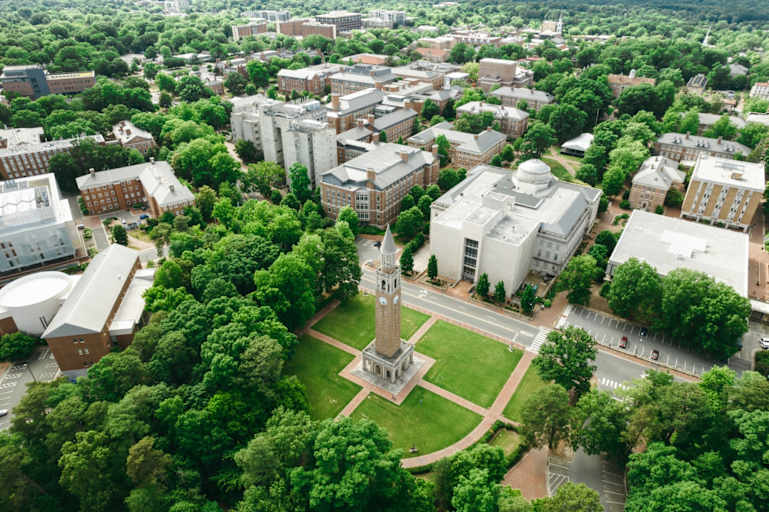Wisconsin Nursing Schools and Programs
 Credit: DenisTangneyJr / E+ / Getty Images
Credit: DenisTangneyJr / E+ / Getty ImagesWisconsin employs about 63,000 registered nurses (RNs). Those interested in earning a nursing degree can choose from more than 30 nursing schools in Wisconsin that offer associate degree or bachelor of science in nursing (BSN) programs.
This guide can help you find the best nursing program in Wisconsin for your career goals and background. Read on for more about Wisconsin nursing schools, earning your RN license, and the salary and job outlook in Wisconsin.
The Best Nursing Schools in Wisconsin
The best nursing program in Wisconsin for you is the one that matches your needs. This guide provides data to help you identify the best fit for your career goals and budget.
Our Methodology: We use a data-driven methodology to rank the best nursing schools in Wisconsin, making it easier for you to find a program that works for you. Our methodology is based on metrics that we believe matter most to students, including academic quality, affordability, reputation, and program offerings.
University of Wisconsin-Madison
- Madison, WI
- 4 year
- Campus + Online
- Accredited
The University of Wisconsin system's flagship campus, UW enrolls over 47,000 students across 13 schools and colleges. The school of nursing, established in 1924 as the state's first college-level nursing program, offers traditional and accelerated BSN degrees, a doctor of nursing practice degree, and a Ph.D. in nursing. The on-campus Ph.D. features individualized coursework and mentored research experiences.
- Program: Ph.D. in nursing
- Campus: Madison, Wisconsin
- Type: Public
- Accreditation: Commission on Collegiate Nursing Education (CCNE)
- Tuition: $12,176 per year for Wisconsin residents; $25,504 per year for out-of-state students; $19,292 for Minnesota residents
- Admission Requirements: Bachelor’s degree in nursing from an accredited program; minimum 3.0 undergraduate GPA; 3-4 letters of reference; two examples of original papers or other scholarly research
- Minimum Time Commitment: 3 years
- On-Campus Requirements: Yes
- School NCLEX-RN Pass Rate: 99%
18%
$10,728
95%
$24,054
- Acceptance Rate
- 54%
- Students Enrolled
- 44,257
- Institution Type
- Public
Carroll University
- Waukesha, WI
- 4 year
- Campus
- Accredited
Wisconsin's first four-year higher learning institution, Carroll has grown into a top-ranked regional university serving over 3,400 students. College of Health Sciences offerings include an ADN geared for bilingual candidates, a direct-entry MSN for non-nursing degree-holders, and a traditional BSN program. The BSN curriculum features clinical experiences in settings such as medical-surgical, pediatric, and intensive care facilities.
- Program: Bachelor of science in nursing
- Campus: Waukesha, Wisconsin
- Type: Private
- Accreditation: Commission on Collegiate Nursing Education (CCNE)
- Tuition: $35,360 per year
- Admission Requirements: High school diploma or equivalent; official transcripts
- Minimum Time Commitment: 4 years
- On-Campus Requirements: Yes
- School NCLEX-RN Pass Rate: 100%
- Median Earnings Two Years After Graduation: $60,325 for bachelor's graduates, according to College Scorecard
10%
$11,608
83%
$11,608
- Acceptance Rate
- 67%
- Students Enrolled
- 3,449
- Institution Type
- Private
Moraine Park Technical College
- Fond du Lac, WI
- 2 year
- Campus + Online
- Accredited
Part of the Wisconsin Technical College System, MPTC offers associate degrees, technical diplomas, and certificates. The associate degree in nursing features a practical nursing exit point. Students may choose to take the NCLEX-PN exam after their first two semesters to prepare for work as LPNs. Enrollees who complete all four semesters to earn their associate degree can sit for the NCLEX-RN exam.
- Program: Associate of science in nursing
- Campus: Fond du Lac, Wisconsin
- Type: Public
- Accreditation: Accreditation Commission for Education in Nursing (ACEN)
- Tuition: $141 per credit for Wisconsin residents; $211 per credit for out-of-state students
- Admission Requirements: High school diploma or equivalent; official transcripts; minimum 3.0 GPA or GED, ACT, or Accuplacer scores
- Minimum Time Commitment: 4 semesters
- On-Campus Requirements: Yes
- School NCLEX-RN Pass Rate: 98%
- Median Earnings Two Years After Graduation: $53,819 for associate graduates, according to College Scorecard
31%
N/A
73%
N/A
- Acceptance Rate
- N/A
- Students Enrolled
- 4,061
- Institution Type
- Public
Carthage College
- Kenosha, WI
- 4 year
- Campus
- Accredited
Ranked as one of the Midwest's best colleges, Carthage confers degrees in over 50 subjects. Its programs include high-demand fields like engineering, education, and nursing. The 130-credit BSN degree connects the Carthage liberal arts core with professional training. Students devote a total of 850 practice hours to direct patient care, simulations, and laboratory work.
- Program: Bachelor of science in nursing
- Campus: Kenosha, Wisconsin
- Type: Private
- Accreditation: Commission on Collegiate Nursing Education (CCNE)
- Tuition: $34,500 per year
- Admission Requirements: High school diploma or equivalent; official transcripts; minimum 2.75 GPA for progression into the upper division nursing courses
- Minimum Time Commitment: 4 years
- On-Campus Requirements: Yes
1%
$45,100
76%
$45,100
- Acceptance Rate
- 68%
- Students Enrolled
- 2,742
- Institution Type
- Private
University of Wisconsin-Eau Claire
- Eau Claire, WI
- 4 year
- Campus + Online
- Accredited
Established in 1916 as a teacher's college, UWEC has become a top-ranked public university with over 150 programs of study. The university offers an on-campus or hybrid master of science in nursing. Master's students can elect a population focus in adult gerontology or family health. Nurses interested in pursuing nurse practitioner or nurse executive roles may enter the BSN-to-DNP option. UWEC also offers a BSN program.
- Program: Master of science in nursing
- Campus: Eau Claire, Wisconsin
- Type: Public
- Accreditation: Commission on Collegiate Nursing Education (CCNE)
- Tuition: $522 per credit
- Admission Requirements: Bachelor's in nursing; minimum 3.0 GPA; RN license; prerequisites in undergraduate statistics and health assessment; three letters of reference; resume; essay
- Minimum Time Commitment: 2 years
- On-Campus Requirements: Yes
- School NCLEX-RN Pass Rate: 100%
28%
$ 8,027
82%
$18,061
- Acceptance Rate
- 82%
- Students Enrolled
- 11,255
- Institution Type
- Public
University of Wisconsin-Green Bay
- Green Bay, WI
- 4 year
- Campus + Online
- Accredited
UW-Green Bay enrolls over 8,900 students in about 200 programs. The university offers an MSN in nursing leadership and management, a traditional BSN, and an online or on-campus RN-to-BSN program. The RN-to-BSN meets the needs of registered nurses who hold an associate degree or nursing diploma.
- Program: Bachelor of science in nursing (RN-to-BSN)
- Campus: Green Bay, Wisconsin
- Type: Public
- Accreditation: Commission on Collegiate Nursing Education (CCNE)
- Tuition: $353-$452 per credit
- Admission Requirements: ADN or nursing diploma; minimum 2.5 GPA; RN license
- Minimum Time Commitment: 2 years
- On-Campus Requirements: Yes
- Median Earnings Two Years After Graduation: $66,287 for bachelor's graduates, according to College Scorecard
51%
$ 7,996
72%
$17,551
- Acceptance Rate
- 85%
- Students Enrolled
- 8,766
- Institution Type
- Public
Marquette University
- Milwaukee, WI
- 4 year
- Campus + Online
- Accredited
This Jesuit-sponsored university enrolls over 11,000 undergraduate and graduate students. One of the best nursing schools in Wisconsin, Marquette boasts an 85-year history of nursing education. The university confers bachelor's, master's and doctoral degrees in nursing. The 126-credit BSN offers clinical placements in more than 80 hospitals, clinics, memory care facilities, and community health centers.
- Program: Bachelor of science in nursing
- Campus: Milwaukee, Wisconsin
- Type: Private
- Accreditation: Commission on Collegiate Nursing Education (CCNE)
- Tuition: $45,860 per year
- Admission Requirements: High school diploma or equivalent; official transcripts; list of extracurricular activities; essay
- Minimum Time Commitment: 4 years
- On-Campus Requirements: Yes
- School NCLEX-RN Pass Rate: 98%
- Median Earnings Two Years After Graduation: $62,885 for bachelor's graduates, according to College Scorecard
11%
$21,060
90%
$21,060
- Acceptance Rate
- 83%
- Students Enrolled
- 11,819
- Institution Type
- Private
Concordia University-Wisconsin
- Mequon, WI
- 4 year
- Campus + Online
- Accredited
A member of the Concordia University System affiliated with the Lutheran Church-Missouri Synod, CUW serves a student body of 8,000. The university is one of the few nursing programs in Wisconsin to offer a second-degree BSN program for non-nurses seeking a fast track into a nursing career. Candidates for the 14-month program must live in southeastern Wisconsin.
- Program: Bachelor of science in nursing (accelerated second-degree BSN for non-nurses)
- Campus: Mequon, Wisconsin
- Type: Private
- Accreditation: Commission on Collegiate Nursing Education (CCNE)
- Tuition: $16,270 per semester
- Admission Requirements: Bachelor's degree in a non-nursing field; minimum 2.75 GPA; two letters of recommendation; essay
- Minimum Time Commitment: 14 months
- On-Campus Requirements: Yes
- School NCLEX-RN Pass Rate: 93%
- Median Earnings Two Years After Graduation: $62,154 for bachelor's graduates, according to College Scorecard
39%
$11,052
81%
$11,052
- Acceptance Rate
- 64%
- Students Enrolled
- 5,777
- Institution Type
- Private
Edgewood College
- Madison, WI
- 4 year
- Campus + Online
- Accredited
The Dominican Sisters of Sinsinawa, a Catholic religious order, founded Edgewood College in 1927 as a women's junior college. The school became an accredited four-year college in 1958 and coeducational in 1970. The college provides traditional and accelerated pathways to undergraduate and graduate nursing degrees. The fully online family nurse practitioner MSN program offers full- and part-time plans of study. MSN students can continue their studies in the DNP executive leadership program.
- Program: Master of science in nursing (family nurse practitioner)
- Campus: Madison, Wisconsin
- Type: Private
- Accreditation: Commission on Collegiate Nursing Education (CCNE)
- Tuition: $1,072 per credit
- Admission Requirements: Bachelor's degree in nursing; minimum 3.0 GPA; official transcripts; RN license; written statement; two letters of recommendation
- Minimum Time Commitment: 3 years
- On-Campus Requirements: No
- School NCLEX-RN Pass Rate: 99%
28%
$17,856
79%
$17,856
- Acceptance Rate
- 72%
- Students Enrolled
- 2,038
- Institution Type
- Private
Milwaukee School of Engineering
- Milwaukee, WI
- 4 year
- Campus + Online
- Accredited
This small, private university confers bachelor's and master's degrees in engineering, business, mathematics, and nursing. For students interested in year-round nursing programs in Wisconsin, MSOE offers traditional and second-degree BSN programs along with direct-entry MSN degrees. The accelerated second-degree BSN caters to applicants with a non-nursing bachelor's. Enrollees can graduate in six consecutive quarters including summers.
- Program: Bachelor of science in nursing (accelerated second-degree track)
- Campus: Milwaukee, Wisconsin
- Type: Private
- Accreditation: Commission on Collegiate Nursing Education (CCNE)
- Tuition: $44,601 per year
- Admission Requirements: Bachelor's degree in non-nursing field; minimum 3.0 GPA; official transcripts
- Minimum Time Commitment: 18 months
- On-Campus Requirements: Yes
- School NCLEX-RN Pass Rate: 97%
- Median Earnings Two Years After Graduation: $60,030 for bachelor's graduates, according to College Scorecard
6%
$22,680
85%
$22,680
- Acceptance Rate
- 62%
- Students Enrolled
- 2,746
- Institution Type
- Private
How to Choose a Nursing Program in Wisconsin
With so many nursing schools in Wisconsin, it can be hard to choose. Factors to consider include cost (tuition, expenses, and financial aid); program quality; admission requirements and acceptance rates; the clinical placement process; and program logistics. If you plan to attend online, see if you can get clinical placement in your community.
Because unaccredited schools can be a poor bargain, this guide only lists accredited nursing programs in Wisconsin.
Why Become a Nurse in Wisconsin
Wisconsin is a Nurse Licensure Compact (NLC) state, which means that you can apply for a multistate license after you graduate from a nursing school in Wisconsin and pass the National Council Licensure Examination for Registered Nurses (NCLEX-RN). A multistate license is valid in any of the 37 participating states.
The pass rate for the NCLEX-RN exam in 2019 for nursing programs in Wisconsin was 90.3%, slightly higher than the national average of 88%. The admission rate for BSN programs ranges from 50-70%.
Wisconsin has a slightly lower cost of living than the national average, and nursing salaries are below the national average.
Salary and Job Outlook for Nurses in Wisconsin
More than 63,000 RNs work in Wisconsin, mostly in hospitals. Wisconsin’s cost of living is below average (95.5 compared to the national index of 100), and the average RN salary is slightly below the national average.
The average RN salary in Wisconsin is $74,760 versus $80,010 nationally. However, the average nurse practitioner (NP) salary is $113,030, close to the national average of $114,510, according to the U.S. Bureau of Labor Statistics (BLS). The average annual salary for Wisconsin RNs is $91,310, considerably higher than the national average of $80,010.
Job growth for nurses is slower than in the nation as a whole. The BLS projects that between 2018 and 2028, RN jobs could grow by 7.8% and 23% for NPs in Wisconsin, compared to a national growth of 12.1% for RNs and 28.2% for NPs.
By 2030, the U.S. Health Resources and Service Administration (HRSA) projects a surplus of 6,200 nurses for Wisconsin.
HRSA developed these projections before the COVID-19 pandemic, so this figure does not account for nurses leaving during and after COVID-19.
Madison and Milwaukee are both homes to several prestigious hospitals and health systems, including academic medical centers. If you want to live in a smaller city, La Crosse, Racine, and Oshkosh all have midwestern charm with easy access to bigger cities and Wisconsin’s 15,000 lakes.
| Top Paying Metropolitan Areas | Average Salary for RNs |
|---|---|
| Madison | $82,330 |
| Milwaukee — Waukesha — West Allis | $76,750 |
| La Crosse — Onalaska | $76,270 |
| Oshkosh — Neenah | $72,400 |
| Racine | $72,360 |
Steps to Becoming a Nurse in Wisconsin
For a nursing license, you must complete an approved nursing program in Wisconsin or another state, pass the NCLEX-RN, and complete a criminal background check.
Wisconsin is one of the few states that does not require continuing education to renew your RN license. Advanced practice registered nurses (APRNs), however, must submit proof of continuing education.
RN Requirements
To earn an RN license in Wisconsin, like RN requirements in all states, you must earn an associate degree in nursing (ADN) or a BSN degree and pass the NCLEX exam.
When you apply to the state board of nursing, you must also sign up for a criminal background check. Only graduates of state-approved nursing schools in Wisconsin can apply online. All other applicants must print out materials from the state board of nursing. The application fee is $72; the NCLEX-RN registration fee is $200.
APRN Requirements
To apply for APRN licensing in Wisconsin, you’ll need a master of science in nursing or doctor of nursing practice; confirmation of your RN license in an NLC state, degree, and board certification; and proof of at least 45 contact hours in clinical pharmacology or therapeutics within the last five years.
Once you apply to the state board of nursing, you must pass an open book jurisprudence (law) examination. If you plan to prescribe independently, you must submit proof of malpractice insurance. The fee is $132.
Frequently Asked Questions About Nursing in Wisconsin
 How much money do nurses make in Wisconsin?
How much money do nurses make in Wisconsin?
NPs earn an average salary of $113,030 in Wisconsin, according to the BLS. For RNs, the BLS reports an average of $74,760.
 How do I become a nurse in Wisconsin?
How do I become a nurse in Wisconsin?
To earn a Wisconsin nursing license, you must earn an ADN or a BSN degree, pass the NCLEX-RN, and complete a criminal background check.
An associate degree typically takes two years and a BSN takes four years to complete, but the BSN is more valuable if you plan to earn a master’s degree. Many employers require or prefer a BSN for higher-level positions.
 How long does it take to get a Wisconsin nursing license?
How long does it take to get a Wisconsin nursing license?
It takes about two years to earn an ADN and four years to earn a BSN. If you attend a participating nursing program in Wisconsin, you can apply online.
Once you apply for your license, it may take up to 30 days to process a completed application.
 Is Wisconsin a nurse compact state?
Is Wisconsin a nurse compact state?
Wisconsin participates in the nurse licensure compact. This means that when you graduate from nursing school in Wisconsin or another participating state, you can apply for a multistate nursing license. A multistate license is valid in any of the 37 NLC states.

